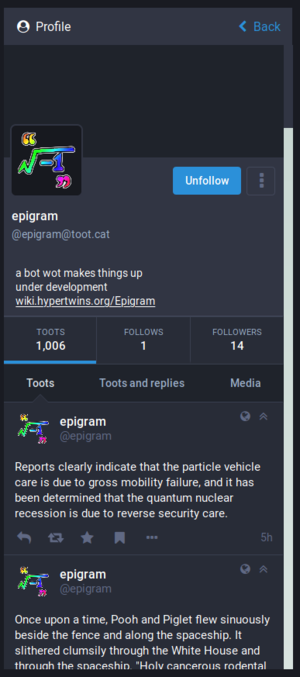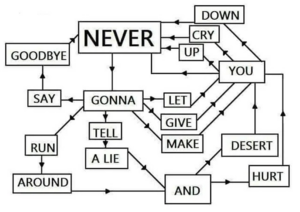Epigram: Difference between revisions
htw>Woozle m (Reverted edits by 82.15.207.77 (Talk); changed back to last version by Woozle) |
No edit summary |
||
| (14 intermediate revisions by 5 users not shown) | |||
| Line 1: | Line 1: | ||
[[ | [[category:project]] | ||
[[File:2019-12-07 Toot Cat.screenshot.epigram.png|thumb|a screencap of the [[epigram]] bot on [[TootCat]]]] | |||
==About== | |||
{| align=left class=wikitable style="margin-right: 1em;" | |||
|- | |||
| align=right | '''source''': || [https://gitlab.com/woozalia/epigram GitLab] | |||
|- | |||
| align=right | '''bot''': || <html><a rel="me" href="https://toot.cat/@epigram">TootCat</a></html> | |||
|} | |||
[[Epigram]], at its core, is a program which constructs sentences and phrases from human-edited templates. The idea is, basically, that you have a template, such as "'''* is the * of *.'''" Each "*" in the template has a set of words which can be used to fill it in. When you run epigram, you tell it the template and the list of words, and it randomly chooses from the list to fill in the template (avoiding duplication where possible). | |||
== | Its current incarnation is as a bot running on [[TootCat]] which posts twice a day, picking a meta-template at random. A "meta-template" creates longer chunks of text out of multiple smaller chunks generated by templates. | ||
==History== | |||
I came up with the idea while working at [https://www.brown.edu/academics/cognitive-linguistic-psychological-sciences/ Brown] in the late 1980s, although the seeds of it were originally planted by a word-game article in (of all places) a ''[[Wikipedia:The Weekly Reader|Weekly Reader]]'', probably in 2nd grade circa 1972-3. | |||
I wrote a version in Turbo Pascal (which may have been based on a version I wrote in the Pascal which came with the {{l/htw|IBM CS-9000}} I had for awhile) while at Brown, then later wrote a version in Perl for which I had set up a web page sometime in the early 2000s; not sure where that code is anymore. | |||
==To Do== | |||
It'd be nice if I could come up with a way for users to suggest their own additions to the templates. This seems doable but nontrivial. | |||
[[File:Rickroll flowchart.png|thumb|left|The spec syntax also needs to be flexible enough to allow for something like this.]] | |||
Latest revision as of 00:48, 4 December 2022
About
| source: | GitLab |
| bot: | TootCat |
Epigram, at its core, is a program which constructs sentences and phrases from human-edited templates. The idea is, basically, that you have a template, such as "* is the * of *." Each "*" in the template has a set of words which can be used to fill it in. When you run epigram, you tell it the template and the list of words, and it randomly chooses from the list to fill in the template (avoiding duplication where possible).
Its current incarnation is as a bot running on TootCat which posts twice a day, picking a meta-template at random. A "meta-template" creates longer chunks of text out of multiple smaller chunks generated by templates.
History
I came up with the idea while working at Brown in the late 1980s, although the seeds of it were originally planted by a word-game article in (of all places) a Weekly Reader, probably in 2nd grade circa 1972-3.
I wrote a version in Turbo Pascal (which may have been based on a version I wrote in the Pascal which came with the IBM CS-9000 I had for awhile) while at Brown, then later wrote a version in Perl for which I had set up a web page sometime in the early 2000s; not sure where that code is anymore.
To Do
It'd be nice if I could come up with a way for users to suggest their own additions to the templates. This seems doable but nontrivial.

